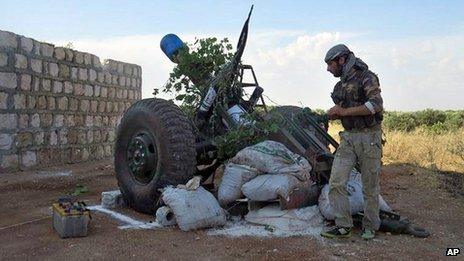What is driving EU Syria arms embargo move?
- Published
- comments

The abandonment of the European Union's arms embargo on Syria is a piece of diplomatic signalling that could prove as confused in its effects as it was in its origins.
If that seems like an unkind interpretation of an attempt to alleviate a human tragedy try to follow this: the embargo was introduced to hurt the Assad regime but is now being lifted to help the opposition, even though the UK currently has no intention of actually sending them any weapons, but the mere possibility of this measure increasing the arms flow to these groups has today caused Russia to threaten to send even more advanced hardware to the Syrian government.
So it is possible in theory that the expiry of the EU's ban may lead to a negligible increase in supplies to the opposition but boost those available to the Assad forces.
Of course this must be qualified in many ways, not least that Russia may be playing its own diplomatic gambit by threatening to send S-300 anti-aircraft missiles, it may not follow through with the threat, and that considerable supplies of weapons (arranged by Saudi Arabia and Qatar) are already reaching the rebels.
One of the stated reasons given by the UK and France for standing in the way of the continued ban that most of their EU partners wanted is that the prospect of their supplying the opposition with hardware such as anti-aircraft missiles might tilt the balance of forces on the battlefield, improving and also increasing the chances of the Assad regime turning up at the peace talks slated next month for Geneva.
William Hague, the UK foreign secretary, said: "It was important for Europe to send a clear signal to the Assad regime that it has to negotiate seriously, and that all options remain on the table if it refuses to do so."
Will the prospect of some half-hearted European involvement really have such an effect on an embattled regime that may believe it is gaining the upper hand?
The recent history of supplying arms to non-state groups shows that Britain is extremely reluctant to do it, and may not have done so since the 1980s when supplies were sent to the Afghan mujahideen.
In Bosnia the UK declined to create what the foreign secretary at the time called a, "level killing field", and in Libya it also decided not to send weapons even though RAF aircraft were bombing government forces and British Special Forces were (eventually) put on the ground.
I am told the current discussions in Whitehall on the feasibility of sending weapons to the Syrian opposition have floundered in the face of legal and policy objections.
The case of France is a little different. It did send limited arms supplies to the anti-Gaddafi opposition in Libya and have recently intervened energetically in Mali.
It may be that the diplomatic effect that the UK and France are hoping to exert in lifting the arms embargo is one upon the opposition rather than the Assad government.
Privately officials are scathing about the disunity of opposition groups, some of which oppose any talks with the Assad government. A video has emerged on YouTube of a French diplomat dressing down members of the opposition coalition in Istanbul late last week, as they battled to agree a common line on the peace talks.
Both West European countries know it is vitally important to get the opposition to the "Geneva 2" negotiations next month. If they decline to come but President Bashar al-Assad's delegation turns up it could be highly awkward for those who back the opposition.
Perhaps the kindest interpretation of the change in EU policy may therefore be that is designed to build bridges with the Syrian opposition and insure the participation of a broad-based delegation in Geneva, where some slim hopes of a peace process are still being nurtured.